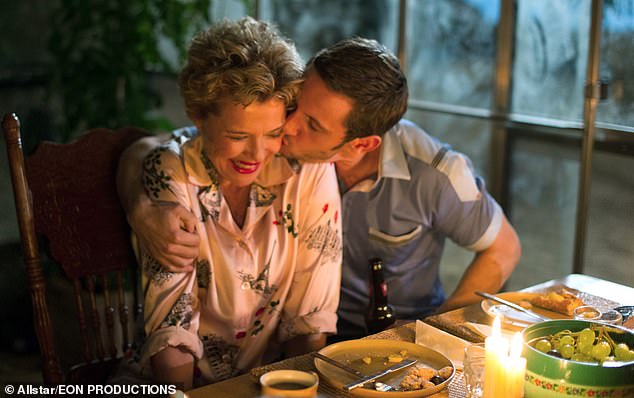My widowed grandmother is quite young-at-heart for 77 and is dating a man who is 41.
She is happy and says he’s not after her money but as her family, we are terrified. My grandfather left her comfortably off and we fear she might be fleeced and left in penury. Or her boyfriend may be after our inheritance which would be substantial.
My parents want to stage an intervention, whereas her three adult grandchildren (me included) think it could alienate her so she never speaks to us again. We don’t know what to do – what do you think?
C.W. Edinburgh

Annette Bening and Jamie Bell star in Don’t Get Old in Liverpool, about a woman’s romance with a much younger man
Money Psychotherapist Vicky Reynal replies: It is understandable to be worried and to want to protect your grandmother from potentially being manipulated. I don’t think this is an either/or situation, as in you either have an intervention or you say nothing.
I think you are right: an ‘intervention’ involving the whole family making a strong point might leave her feeling ganged up on and, as you say, alienate her. This requires a more delicate conversation, in which maybe one or two family members approach her.
The language should be tentative and not accusatory (‘you are naïve’ or ‘he is after your money’) so that she is not thrown into a defensive position from the start. You want to convey to your grandmother that out of care for her you want to make sure that she is looking after her finances, and not leaving herself open to unintentionally giving away more than she is comfortable with. This is different from saying ‘he is scamming you’ or ‘he is taking advantage of you’. It is tempting to make strong statements if we don’t feel we are being heard, but you risk having the opposite effect.
You could use the third person to make your grandmother aware of scenarios she could be mindful of, ‘it’s not unheard of for people to start using their partner’s credit card without their knowledge’ or maybe ‘there are professionals who can advise you on the best way to protect your finances’.
Let’s be clear: it’s obvious that you are insinuating that you feel her partner could have exploitative intentions, but it’s still a softer way of being direct than making accusations which might or could be unfounded.
But listen, too. Your grandmother might have considered all of the above and have addressed it already one way or another. Maybe she has already taken precautions, or maybe she has idealised this man and is in denial about the risks. It is possible, too, that she is fully aware of the risks yet still wants to live this romance and enjoy the happiness and companionship that it brings her now, knowing that if there are consequences she’ll face them down the line.
Ideal? No, but ultimately, however, the choice is hers.
In fact, that could be the very reason why all this is happening: as we age and we become worried about the potential loss of autonomy that comes with an ageing mind and body, so she could be making a strong statement to the family about the fact that she still has choice and agency in her life and she is not ready to give that up. This young boyfriend could be a way to hold on to her youth, and her freedom.
If your grandmother wants to leave all her inheritance to her younger boyfriend, it’s her prerogative. You and the rest of the family might find it outrageous and feel robbed and angered by this, but we are all entitled to make our choices – even if that means having to live with the consequences. For the family, it’s about finding a balance between making her conscious of some risks without becoming controlling or judgemental.
Do you have a question for Vicky Reynal? Email vicky.reynal@dailymail.co.uk



